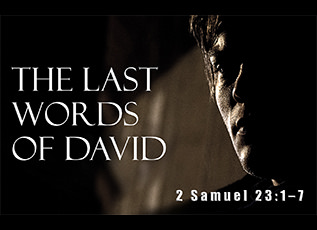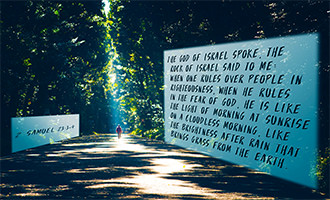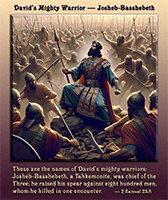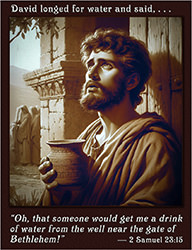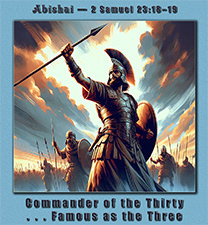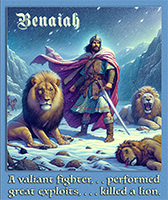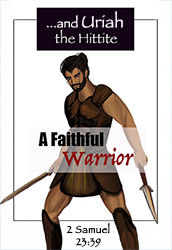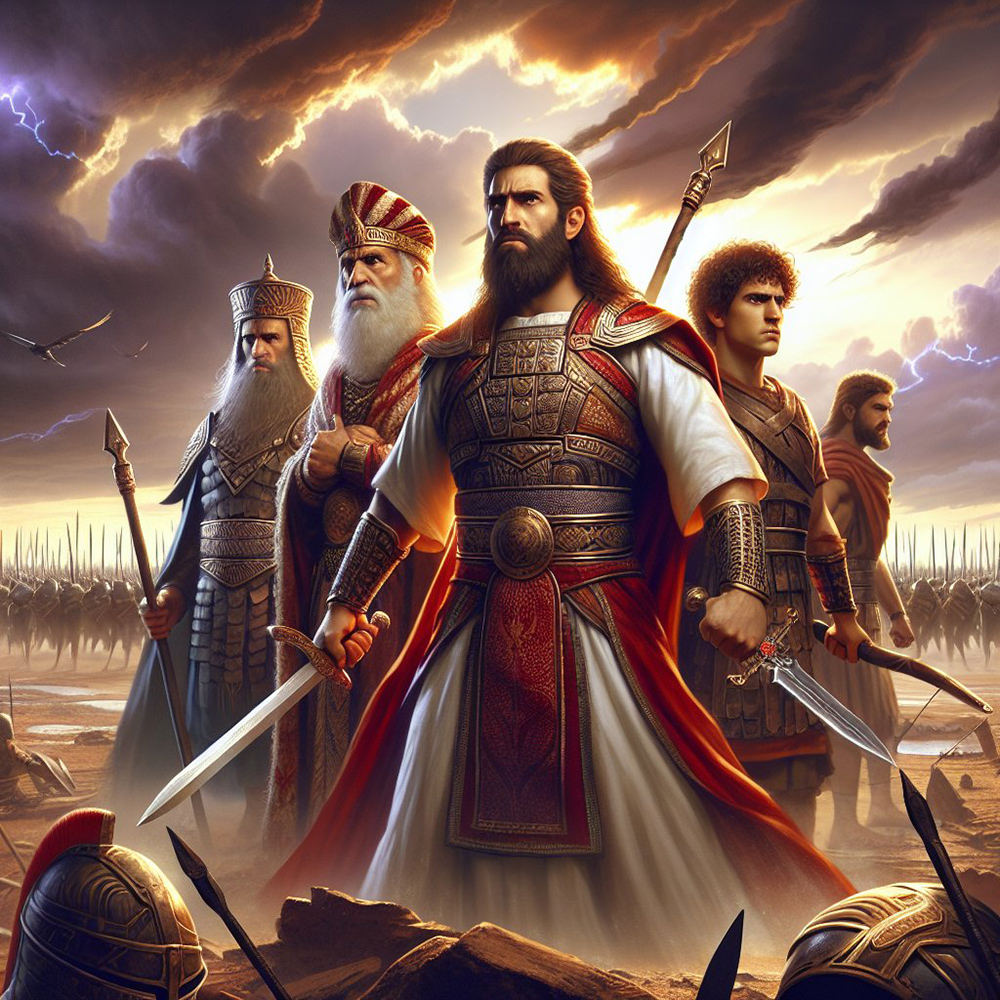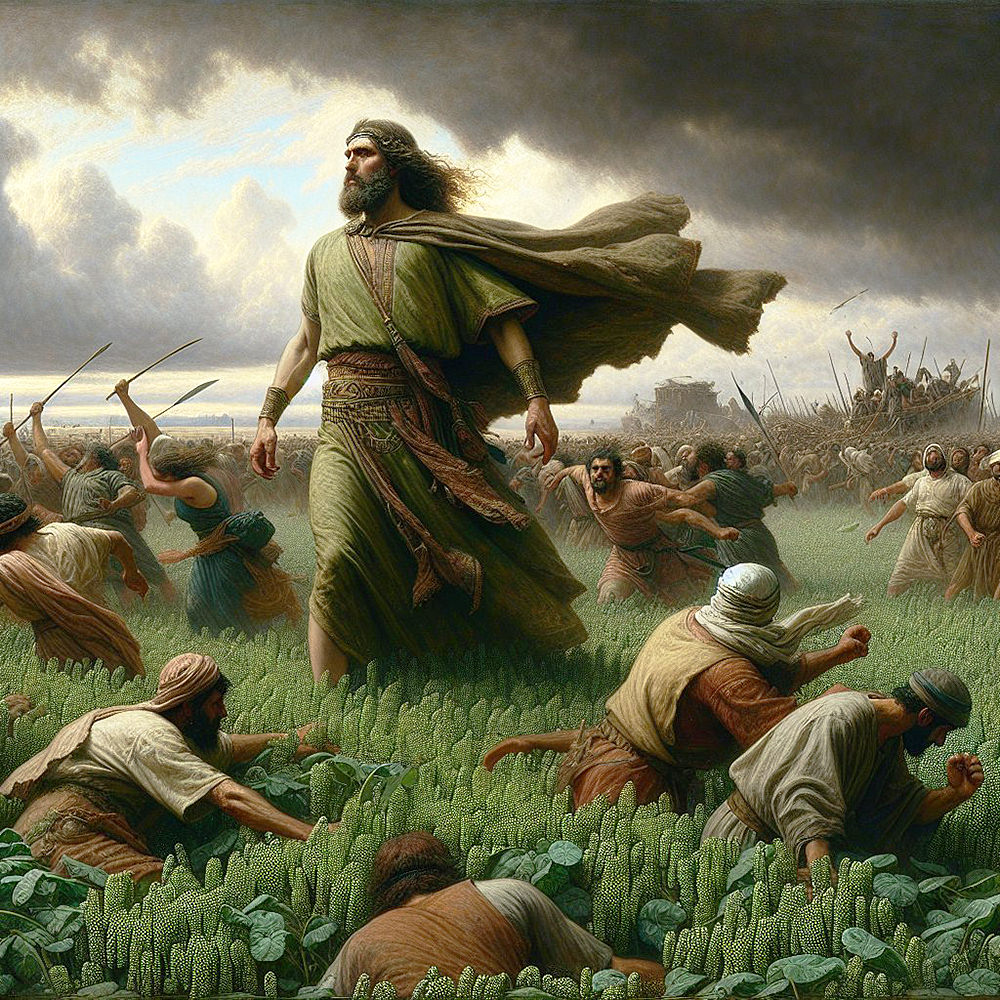2 Samuel 23:1–39 . . . Bible Study Summary with Videos and Questions
“David’s Last Words”
In this chapter, the author provides “David’s last testament.” The combination of his final song (highlighted in last week’s summary), followed by his last testament here in vv. 1–7, recall the similar combination of Moses: his closing song and his last testament (Deuteronomy 32 and 33). David’s last words were his final literary legacy to Israel. His claim to divine inspiration, in v. 2, is very strong. Whereas his psalm in the previous chapter celebrates the delivering acts of Yahweh, by which the Davidic supremacy was established, this little seven-verse poem/song/psalm was composed around the theme of a dynastic covenant through which the continued prosperity of the Davidic house was assured.
The same great spiritual themes come through here, as in the previous chapter and the whole historical account recorded in 1 and 2 Samuel. The ancients regarded the last words of people as significant; the last words of Israel’s great leaders were more important; the last words of prophets were extremely important (Genesis 49; Deut. 33; Acts 20:17–38, etc.), and their final words often expressed lessons that those who’d walked with God for many years had learned well.
[Note: Click the link to This Week’s Passage near the bottom of this page to read today’s Scripture.]
The Last Words of David (2 Samuel 23:1–7)
In these first seven verses, David’s last testament celebrates two primary concerns: (1) his having been chosen by Yahweh, and (2) his awareness of how the LORD guided and helped him. In the remaining verses, he’ll pay tribute to his mighty warriors — thirty-seven in all. The last man named in his list is Uriah the Hittite.
David’s psalm in these first seven verses is something of a “view from a hearse.” The author tells us in v. 1 that this is the last of David’s recorded words. In his golden years, as he neared the time of death, he looked back upon his life while also looking forward to his eternal hope. His psalm may seem detached from and unrelated to the remainder of the chapter’s text that names and honors those mighty heroes who significantly contributed to his success. However, you might realize that both sections of this chapter are very related. After all, the entire chapter is about greatness. In vv. 1–7, we see what makes a great king; in vv. 8–39, two sets of great men are named, the “three” and the “thirty.” In the process of describing their heroic conduct, we’re told what made these men great in God’s eyes.
David’s Last Words
These are the last words of David: “The inspired utterance of David son of Jesse, the utterance of the man exalted by the Most High, the man anointed by the God of Jacob, the hero of Israel’s songs: … (2 Sam. 23:1)
As v. 1 indicates, these were David’s last words: not last in the sense that he spoke these words and died, never speaking another word, but perhaps in the sense that these were his last-known recorded words that he spoke in the form of a psalm.
From his humble beginnings as the youngest son of Jesse, David, a man of no great standing in Israel was raised on high by God. He’d become the “anointed one,” the king, who was an offspring of Jacob. On one hand, being a descendant of Jacob was nothing to brag about, but this notation links David with the Abrahamic Covenant (Gen. 12:1–3, etc.) and the promise to Jacob that through his son Judah, the Messiah would come (49:8–10).
Now David almost marvels at the prophetic gift he’d been given. To have been used by the great God of the Universe to fulfill His purposes was such a great and undeserved honor! Beginning in v. 2, David’s recorded words begin by underscoring the fact that his words weren’t merely his own — they conveyed the words of God that were miraculously spoken to him and through him. David attributed his words to the Holy Spirit who’d spoken through him. So David’s words were also God’s words. In vv. 3b–4, David came to the main message of this prophetic word: the importance of ruling righteously, with respect to God and his will.
Remember that God spoke to David about what constituted a righteous ruler. God’s king was to rule over men righteously. This righteous rule was to be an outgrowth of a healthy and appropriate fear of God (v. 3). Heathen kings thought primarily in terms of being over others; God’s king was instead to think in terms of being under God. That king or leader who’d rule righteously and fear God would be like: (1) sunrise’s light on a cloudless morning (v. 4a), and (2) the brightness after rain that grows the grass (4b).
Righteous leadership inspires and enables productivity; wickedness stifles and suppresses it. The psalmist uses imagery and parallelism to paint a picture of the brightness and refreshing glory for a people that a righteous government brings. The pair of verses highlight how David’s poetic style blends vivid natural imagery with parallel Hebrew thought to express the beauty of righteous leadership.
In David’s final poem he made his declaration (v. 5), with the subject turning to him and his house or dynasty. He confidently spoke of a reign of righteousness for his house, which wasn’t due to his merits or self-righteousness but instead to God’s grace, assured through His covenant with David (2 Sam. 7:14). Based upon that covenant, David was assured of an eternal reign of righteousness; signed, sealed, and delivered, as fulfilled, ultimately and permanently, in the person of Messiah, LORD Jesus Christ. This was David’s ultimate salvation and desire, directly brought about by God, the author and finisher of all salvation. His song of salvation was centered on God.
The center of this short opening psalm shows David’s wonder at God’s grace towards him and his descendants. God had justified David, having made with him and his offspring a secure and everlasting covenant. God’s promises are great! David was assured of God’s blessing to fulfill those promises, as documented in v. 5d: “If my house were not right with God, surely he would not bring to fruition my salvation and grant me my every desire.”
Note: David wasn’t a universalist who thought that his expressed blessings were for all mankind. Consequently, at the close of his salvation song, he turned his attention to the fate of the wicked, those who rejected God’s salvation through the Messiah. The imagery of vv. 6–7 follows closely that of v. 4, but in contrast. When the righteous King of Israel (Jesus Christ) comes to rule the earth, his kingdom will cause the righteous to flourish, as the rain and sun cause grass to sprout and grow. But the wicked aren’t likened to grass but to thorns, which aren’t valued, harvested, and stored up for future use; they’re dealt with carefully. Those who handle thorns don’t carelessly take them in hand or they’d be injured by them. Instead, people are to use a metal blade to cut and then burn the thorns (v. 7).
David’s dying thoughts don’t hinge on what he had or hadn’t done, but rather on what God had done . . . and continues to do.
In this short final psalm of David’s, we see in him a faith and wonder that characterizes his reign and his body of work in the Psalter. He praised God for being given the gracious prophetic Spirit, with Yahweh choosing to anoint him as king for God’s righteousness. The God-given Davidic Covenant, over the centuries, affected David, his descendants, and ultimately the Son of David and all whose lives the Messiah will touch.
The First Three, the Top Three (vv. 8–12)
Following his psalm, David named thirty warriors of the covenant who were known by the LORD and to us, many generations later. But it’s the name at the end of the list that might make your stomach lurch: Uriah the Hittite (v. 39). He’s the same Uriah who’d married Bathsheba; the same Uriah who was killed to cover up the king’s sinful act(s); the same mighty man who was snuffed out by a more powerful one.
In the covenant that God made with David, He ordered every detail in David’s life and beyond to uphold that covenant. This second segment of chapter 23 gives us a glimpse into those details — a brief and profound look into God’s provision for David and for all the people in the covenant, through the exploits of his “Mighty Men.” This group of more than thirty were named and known by the LORD and David. Their devotion to God’s anointed king was no accident; neither was the bravery and might they displayed on his behalf. The first of the “three” mighty men was named Josheb-Basshebeth, chief of the captains (see image right). Described as the chief (or “head”) of the Three, the text in v. 8 NIV says, “…he raised his spear against eight hundred men, whom he killed in one encounter” — probably not necessarily meant to be a literal headcount of 800 individuals slain single-handedly, but rather a poetic and honorific expression of extraordinary valor.
The next hero among the big three was Eleazar, son of Dodai the Ahohite, who fought with David against the Philistines until he quite literally couldn’t go on. The third hero was Shammah, the son of Agee. As others fled, he held his ground while battling the Philistines single-handedly in the middle of a lentil field where the LORD gave the Israelites victory, killing numerous Philistines.
The Trio of Water Carriers (vv. 13–17)
A different trio of men risked their lives just to bring a thirsty, homesick King David a drink of water from his hometown well. The incident described in these five verses likely occurred before David became king, while he was fleeing from Saul. The “cave of Adullam” was first mentioned in 1 Sam. 22:1. It’s where David hid after fleeing Gath, and where a number of his kinsmen joined him. At some point in time, David and his men were in this cave while they were at war with the Philistines who’d taken possession of his hometown, Bethlehem, where they were garrisoned. During this time, he had a nostalgic longing for the taste of water from a well near his boyhood home. Perhaps as they were running out of water, he verbalized what was meant only as a wish: If only I could have but a drink from that well in Bethlehem. No doubt he’d drunk from it many times in his younger years and grown particularly fond of that well’s water.
Some of his men couldn’t have missed overhearing what David had said. He gave no orders to fetch water from that well! He hadn’t even thought that anyone would be prompted by his words and then attempt to carry back water. But to these three brave men, David’s wish was their command. The trio left the safety of the cave, marched 12 or so miles to Bethlehem, broke through enemy lines, drew water for David, and then marched back 12 miles to bring it to him.
When presented with that water, David did what at first seems surprising: He refused to drink it. Instead he poured it on the ground, not because he’d disdained the efforts of these courageous men, nor because he didn’t want to drink that water. He likely refused to drink it because the courage of those who’d carried it back to him was so noble. He never intended to risk their lives; he merely uttered a yearning to satisfy his desire. The level of devotion his men showed him was God-like. Pouring that water out before the LORD was David’s highest expression of appreciation and regard for these men. The water was a symbol of the blood that these men could have shed while serving him. “Such were the exploits of the three mighty warriors” (v. 17b).
Abishai (vv. 18–19)
Abishai was related to David, along with his brothers Joab and Asahel. These men were the sons of David’s sister, Zeruiah (v. 18). Abishai was a great warrior and military leader: He was the one who volunteered to accompany David into Saul’s camp in what appeared to be a virtual suicide mission (1 Sam. 26:6–12); he commanded some of David’s forces in a campaign against the Syrians and Ammonites (2 Sam. 10:9–14); he led a third of David’s troops against Absalom’s rebels (2 Sam. 18:2); he was given command of David’s troops in order to quell Sheba’s rebellion (2 Sam. 20:6); and under his command, the Israelite army was able to kill 18,000 Edomites in the Valley of Salt.
However, Abishai was a thorn in David’s flesh. When he and David came upon Saul in his camp, Abishai was eager to kill the king, God’s anointed (1 Sam. 26:6–8). He and his brother Joab were responsible for killing Abner, in retaliation for the death of their brother Asahel in battle, at the hand of Abner (see 2 Sam. 3:26–30).
Abishai and Joab also wanted to put Shimei to death for harassing David as he fled from Absalom, even though David was willing to pardon him (2 Sam. 16:5–14). When David was returning to Jerusalem, and Shimei met him in repentance, Abishai wasn’t satisfied; he urged David to let him kill Shimei because he’d cursed the king (2 Sam. 19:16–23).
In spite of all of Abishai’s flaws, he was a mighty man of valor, whose courage and skill in war couldn’t be denied; he was given a prominent place in Israel’s military “hall of fame.” Our text in v. 18 informs us that he once raised his spear against 300 of the enemy’s army and killed them. Among the Thirty men of might, Abishai ranked at the top, but never attained membership in the elite group known as the “big Three” (Josheb-Basshebeth, Eleazar, and Shammah).
To clarify: Abishai commanded a large, elite unit (The Thirty) and was more celebrated than many of its members, but he didn’t meet the specific, perhaps chronological or symbolic, criteria for membership in the most exclusive and legendary group: The Three. His role was one of command of The Thirty, but he wasn’t a co-member of the top-tier legendary trio.
Lion-Hearted Benaiah (vv. 20–23)
Benaiah was the son of a valiant man who’d done mighty deeds himself. He killed Moab’s two mightiest warriors. While that might not seem that impressive, realize that he also descended into a pit on a snowy day to kill a lion (v. 20), and he succeeded! Possibly that “pit” was a cistern from which the Israelite warriors couldn’t get water because a lion had fallen into it and was unable to get out. Who’d want to debate water rights with a lion? As important as water was to an army, Benaiah seemingly volunteered to go down into the cistern to remove the lion in one way or another. In spite of all the obstacles and difficulties, he succeeded.
There’s yet another incident that our author reports to show how great a hero Benaiah was. A Goliath-sized Egyptian man confronted Benaiah on the battlefield (v. 21). The problem for Benaiah was that he encountered this impressive fellow without much of a weapon. The Egyptian had a spear like that of Goliath and was more than eager to battle Benaiah. So, holding only a club, Benaiah approached the Egyptian, using his club to overpower the Egyptian warrior. Taking the Egyptian’s spear from his hand, Benaiah then proceeded to finish him off using the Egyptian’s spear, similar to how David finished off Goliath using Goliath’s sword (1 Sam. 17:50–51).
An amazing thing about Benaiah is that he was the son of a Levitical priest (1 Chronicles 27:5). We wouldn’t expect a Levitical priest to take on lion-like men and actual lions. Yet, here was a priest willing to dirty his hands and put his faith to practice. Perhaps it was as a reward for his faithful service that David put him in charge of his bodyguards, commanding the Cherethites and the Pelethites (2 Sam. 8:18; 20:23).
Many Other Mighty Heroes Cited (vv. 24–39)
The author concludes his fighters hall of fame by listing at least 30 men who were mighty men of war. He tells us that there were thirty-seven in all, yet the actual count is less, partly because we don’t know how many “sons of Jashen” (v. 32) there were. Also, some of these men (like Uriah) had died and were replaced by others. If there was something of an honor guard of thirty of the bravest, most heroic soldiers, the ranks would have probably been filled by new inductees when honor guard members died.
Of the many named was Eliam, the son of Ahithophel (v. 34b). This man is notable among the mighty men because he was the father of Bathsheba (11:3). It shows that Ahithophel was Bathsheba’s grandfather.
The closing mention of Uriah (v. 39) is certainly significant because it serves as a powerful, tragic commentary on King David’s greatest sin, while simultaneously immortalizing Uriah as a man of exceptional honor, loyalty, and integrity. His inclusion as the final name among David’s elite warriors, “The Thirty,” is important for several key reasons: (1) his unwavering loyalty, (2) his solidarity with fellow soldiers, and (3) his righteousness as a non-Israelite Hittite foreigner serving Israel.
Uriah wasn’t just a draftee. He was one of the elite warriors who fought for David and for Israel. He’s notable among the mighty men because he was Bathsheba’s husband. When David heard of her relation to Uriah and Eliam and Ahithophel, he should have put away every idea of adultery. It hardly seems possible that while David knew Uriah fairly well, he was willing to sinfully take his wife, attempt to deceive this war hero, and use his loyalty and skill as a warrior as a means to kill him.
Note: Uriah was worthy of the closing mention not just because he was a mighty warrior, but because his righteous life and tragic, unjust death provided the most potent moral contrast to King David’s sin, making him an enduring symbol of loyalty betrayed.
The thirty-seven remarkable men were the foundation of the greatness of David’s reign. They didn’t come to David as great men; God used David’s leadership to transform them from men who were discontented, in distress, and in debt. They met David back at Adullam Cave (1 Sam. 22:1–2) where their lives changed significantly. More than all his victories against outside foes, the influence of David’s life and character on the men nearest to him testifies to his essential greatness.
† Summary of 2 Samuel 23:1–39
This chapter contains both David’s final recorded words and a detailed list of his mighty warriors. In his final oracle, David speaks as Israel’s anointed king and as one guided by the Spirit of the Lord (23:1–2). He reflects on the calling of a righteous ruler who governs in the fear of God, comparing such leadership to the light of morning and the vitality following rain (vv. 3–4). David acknowledges God’s everlasting covenant with him, affirming his trust in God’s faithfulness as the source of his security and hope, while contrasting this with the fate of the wicked, who are like thorns to be destroyed (vv. 5–7). This section frames David’s reign in terms of divine calling, covenant promise, and the sharp distinction between righteousness and evil.
The chapter then transitions into a roll call of David’s elite warriors, celebrating their exceptional feats and loyalty (vv. 8–39). It names the Three — Josheb-Basshebeth, who slew 800 men in one encounter; Eleazar, who stood his ground when others fled; and Shammah, who defended a field against Philistines (vv. 8–12). It recounts the act of three unnamed warriors who risked their lives to bring David water from Bethlehem, which he poured out to the Lord in reverence (vv. 13–17). Abishai and Benaiah are honored for their courage and leadership (vv. 18–23). The record concludes with a list of additional mighty men, highlighting the broad base of valorous support around David’s throne (vv. 24–39).
Key points with verse references:
• David’s final oracle affirms that a ruler who governs righteously and in the fear of God brings life and blessing, like light after dawn and rain on the earth (vv. 1–4).
• David praises God’s everlasting covenant with him as the basis for his confidence in God’s salvation and the defeat of the wicked (vv. 5–7).
• Josheb-Basshebeth, Eleazar, and Shammah, known as the Three, are celebrated for extraordinary acts of bravery against the Philistines (vv. 8–12).
• Three unnamed warriors risk their lives to draw water from Bethlehem for David, which he pours out as an offering to the Lord (vv. 13–17).
• Other distinguished warriors, including Abishai and Benaiah, are honored for their courage, and a list of additional mighty men closes the chapter (vv. 18–39).
This passage stands as both a tribute to godly leadership and to the brave men whose devotion helped secure David’s kingdom.
This Week’s Passage
2 Samuel 23:1–39
New International Version (NIV) [View it in a different version by clicking here; also listen to chapter 23 narrated by Max McLean.]
Summary Video: “The Second Book of Samuel”
† Watch this introductory video clip created by BibleProject on bibleproject.com.
- Q. 1 How does David describe himself in v. 1?
- Q. 2 What’s the main message of vv. 3–7?

